- Home
- »
- Medical Imaging
- »
-
Orthopedic Imaging Equipment Market Size Report, 2030GVR Report cover
![Orthopedic Imaging Equipment Market Size, Share & Trends Report]()
Orthopedic Imaging Equipment Market Size, Share & Trends Analysis Report By Modality (X-ray, MRI, CT), By Indication (Trauma Cases, Bone Disorders), By End Use (Hospitals, Diagnostic Imaging Centers), By Region, And Segment Forecasts, 2024 - 2030
- Report ID: GVR-4-68040-241-7
- Number of Report Pages: 185
- Format: PDF, Horizon Databook
- Historical Range: 2018 - 2022
- Forecast Period: 2024 - 2030
- Industry: Healthcare
Market Size & Trends
The global orthopedic imaging equipment market size was estimated at USD 4.92 billion in 2023 and is expected to grow at a CAGR of 5.10% from 2024 to 2030. Growing incidence of bone injuries and orthopedic disorders and increasing penetration of imaging technology in orthopedic treatment are some of the major factors contributing to market growth. For instance, according to the data published by the WHO in July 2022, about 1.71 billion people worldwide have musculoskeletal conditions. Furthermore, constant technological advancements are expected to drive market growth. The growing prevalence of orthopedic disorders, such as osteoporosis, osteomalacia, and arthritis, and increasing incidences of trauma cases resulting in bone injuries are expected to be major driving factors for market growth.
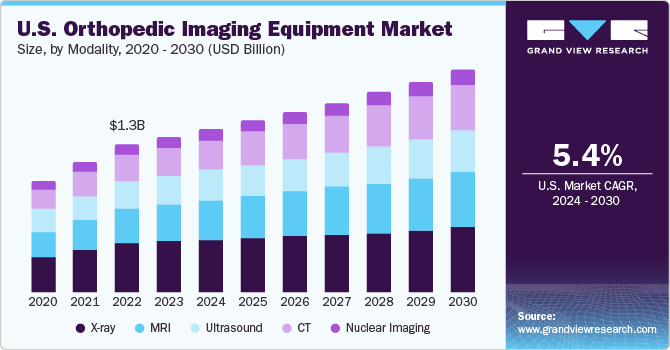
This may be due to various factors, such as changes in lifestyle, the growing geriatric population, and increased awareness about these conditions. For instance, according to the International Osteoporosis Foundation, osteoporosis causes over 8.9 million fractures worldwide each year, which suggests that there is an osteoporosis-related fracture occurring every three seconds. X-rays, CT scans, and MRI scans are some of the imaging techniques used to diagnose bone fractures. These imaging techniques help accurately diagnose and classify the type of fracture, which then guides the treatment plan. In addition, medical imaging plays a vital role in monitoring the healing process and identifying any complications that may arise during recovery.
Overall, medical imaging is an important tool in the management of bone fractures, allowing for timely and accurate diagnosis and treatment. Technological advancements, whether in the form of new product launches or product upgrades, such as the integration of AI, the introduction of miniature handheld devices, and the emergence of virtual and augmented reality (VR/AR), in medical imaging devices used for orthopedic application is another major factor accelerating market growth. For instance, in February 2023, Clarius Mobile Health, a renowned provider of high-definition handheld ultrasound systems, announced that its MSK AI model was granted FDA approval. The model incorporates advanced artificial intelligence (AI) technology to identify and measure tendons in the foot, ankle, and knee with high precision.
Market Concentration & Characteristics
The market growth stage is high, and the pace of its growth is accelerating. The market for orthopedic imaging equipment has seen significant innovation, characterized by advancements in technology that have led to more accurate and efficient imaging results, ultimately improving treatment planning. X-ray continues to be the primary imaging modality for bone imaging, while MRI is preferred for musculoskeletal imaging as it provides better visualization of soft tissues. The integration of AI with these modalities has also played a key role in driving market growth.
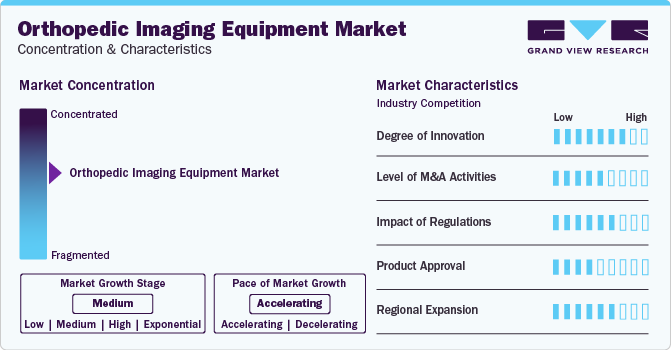
To expand their customer base and gain a larger market share, major players are continuously working to improve their product offerings. This involves upgrading their products, exploring acquisitions, obtaining government clearances, and engaging in important cooperation activities. For instance, in June 2023, MARS Bioimaging and the Hospital for Special Surgery (HSS) in the USA announced a partnership to advance musculoskeletal imaging and diagnosis. The partnership will be focused on MARS' photon-counting spectral CT imaging technology. The two organizations will collaborate to evaluate specific aspects of the MARS 5x120 Extremity Scanner and explore the potential development of new scanning systems and technologies through the HSS Innovation Institute.
Orthopedic imaging equipmenthave achieved a high degree of innovation, owing to remarkable technological advancements that have positioned it at the forefront of medical diagnostics. For instance, in July 2023, Konica Minolta Healthcare Americas, Inc., launched PocketPro H2, a wireless handheld ultrasound device. This wireless handheld ultrasound system is optimized for musculoskeletal (MSK), needle guidance applications, vascular access, and pain management
Major manufacturing companies are undertaking merger and acquisition activities. This strategic approach seeks to improve technological capabilities, expand market reach, and maintain competitiveness. For instance, in March 2022, Canon Medical Systems acquired Nordisk Røntgen Teknik A/S, a Danish medical equipment manufacturer, to strengthen its global X-ray business
The development and use of medical orthopedic imaging equipment are significantly influenced by regulations set by regulatory bodies, such as the U.S. Food and Drug Administration (FDA) and the European Medicines Agency (EMA). These regulations ensure product safety and effectiveness, covering all aspects, ranging from its design and manufacturing to its usage in clinical settings
New product launches by manufacturers to stay competitive in the market and high product demand & adoption for orthopedic applications are key factors driving market growth. For instance, in January 2023, Adaptix Ltd. (Adaptix) received FDA clearance for its first orthopedic medical imaging product.This innovative product is a portable, low-dose imaging system that can provide fast, affordable X-ray imaging at the point of care for patients
The market penetration of orthopedic imaging equipment has been expanding at a moderate to high level. For instance, in April 2023, Siemens Healthineers introduced a new production facility in India to manufacture Magnetic Resonance Imaging (MRI) machines
Modality Insights
The X-ray segment held the largest share of over 32.87% in 2023. X-rays are a valuable diagnostic tool primarily utilized for detecting diseases and abnormalities within bone structures. These include degenerative conditions, fractures, dislocations, infections, and tumors. Furthermore, they provide a cost-effective and easily accessible imaging option, readily available in hospitals and clinics. However, X-rays may not always provide a comprehensive diagnosis for soft tissue injuries like muscle, tendon, or ligament damage, as their strength lies in bone and dense tissue visualization.
The CT segment is expected to grow at the fastest CAGR from 2024 to 2030.CT scan is an efficient technique for orthopedic imaging owing to its capability of providing detailed images of bone structures. This is beneficial for diagnosing complex fractures or evaluating the severity of damage in cases of trauma. Furthermore, a CT scan can be utilized for image guidance during bone biopsy or joint injection.
Indication Insights
The trauma cases segment held the largest share of more than 20% in 2023 owing to increased cases of sports injuries and accidents. For instance, according to the data published by the WHO in December 2023, about 1.19 million people die each year as a result of road traffic accidents. Thus, timely and accurate diagnosis is important for effective treatment, particularly in sports medicine and emergency care settings. Orthopedic imaging plays a vital role in assessing the extent of injury and managing important interventions. The arthritis segment is expected to register the fastest CAGR from 2024 to 2030.
This is due to the rising cases of arthritis and the increasing geriatric population. Although arthritis affects people of all ages, its prevalence increases sharply from the age of 45 years. It can have a significant impact on a person’s physical health, due to the pain and physical limitations associated with the disease. For instance, according to the Centers for Disease Control and Prevention, about 1 in 5 US adults (21.2%), or about 53.2 million people were diagnosed with arthritis during 2019 - 2021. The product’s easy availability, low cost, and non-invasive nature are major factors driving its demand in this segment.
End-use Insights
The hospital segment dominated the orthopedic imaging devices market with a share of over 46.12% in 2023. Hospitals are the first choice for patients seeking orthopedic care, whether for chronic conditions or acute injuries. This is because hospitals are well-equipped to handle various orthopedic cases with a wide range of medical services under one roof, including emergency departments, surgical units, and inpatient care. Hospitals also have access to advanced orthopedic imaging equipment, such as nuclear imaging, MRI, CT, and X-ray machines, which are crucial in the diagnostic process and treatment monitoring.
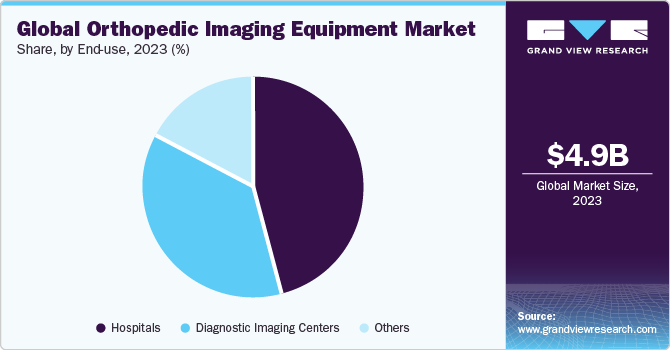
The diagnostic imaging centers segment is expected to grow at a significant CAGR from 2024 to 2030. These centers focus mainly on providing a wide range of imaging modalities, including those specifically made for orthopedic evaluations. Patients prefer radiology centers due to high efficiency, specialized expertise, and reduced appointment waiting times offered by these centers. This is particularly advantageous for individuals seeking routine orthopedic assessments or non-emergency diagnostics.
Regional Insights
The orthopedic imaging equipment market in North America held the largest share of 34.4% in 2023. Technological innovations and growing incidence of chronic conditions are anticipated to propel market growth over the forecast period. Furthermore, high adoption of advanced imaging modalities for orthopedic imaging by end-users is expected to contribute to market growth. For instance, in September 2023, UC Davis Health launched a clinic specializing in musculoskeletal ultrasound to cater to patients with rheumatological conditions.
U.S. Orthopedic Imaging Equipment Market Trends
The U.S. orthopedic imaging equipment market held the largest share in 2023 due to technological advancements, such as the integration of advanced orthopedic software in imaging modalities. For instance, in January 2024, Orthofix Medical Inc, a company specializing in spine and orthopedics, entered into a distribution agreement with MRIguidance to offer BoneMRI imaging software in the U.S.
Europe Orthopedic Imaging Equipment Market Trends
The orthopedic imaging equipment market in Europe held a significant share in 2023. A major focus on R&D activities in the region is a key factor contributing to the regional market growth. For instance, in September 2022, Qure.ai, a prominent health technology company, announced a partnership with Erasmus MC, University Medical Center Rotterdam, to establish the AI Innovation Lab for Medical Imaging. The primary objective of this program, which will run for three years, is to conduct thorough research into the identification of abnormalities through AI algorithms, focusing on both infectious and non-infectious diseases.
The UK orthopedic imaging equipment market is expected to grow significantly owing to the growing cases of orthopedic injuries in the country. Furthermore, growing awareness and adoption of medical imaging are expected to boost market growth. For instance, according to NHS England, about 43.3 million imaging tests were performed in England from April 2021 to March 2022.
France Orthopedic Imaging Equipment Market Trends
The orthopedic imaging equipment market in France is expected to grow considerably from 2024 to 2030 due to the growing cases of orthopedic surgeries in the country necessitating the use of diagnostic imaging devices. For instance, according to the data published in OECD, about 73,011 total knee replacement surgeries were performed in 2021, compared to 30,808 performed in 2020.
The Germany orthopedic imaging equipment market is expected to grow over the forecast period due to a rapidly aging population, high prevalence of orthopedic disorders, presence of a sophisticated healthcare system & highly qualified workforce, and high healthcare spending.
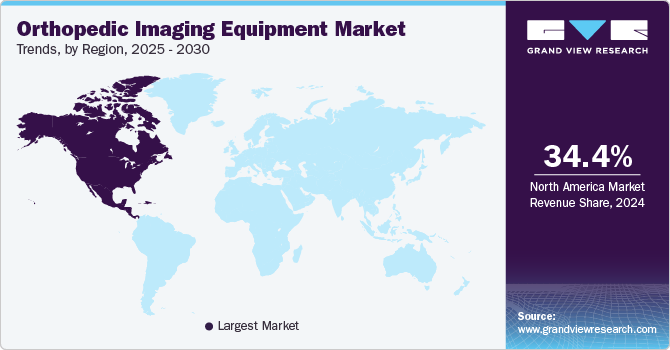
Asia Pacific Orthopedic Imaging Equipment Market Trends
The orthopedic imaging equipment market in Asia Pacific is estimated to witness the fastest CAGR from 2024 to 2030 due to the growing aging population, which is more prone to geriatric orthopedic injuries, and rising demand for advanced imaging devices.
The China orthopedic imaging equipment marketis expected to grow considerably over the forecast period owing to the presence of many market players in the country that adopt various strategies to stay competitive. For instance, in March 2023 in China, Medtronic and First Imaging collaborated to provide improved and easily accessible orthopedic treatments by combining Medtronic's orthopedic navigation system with First Imaging's mobile 3D C-arm.
The orthopedic imaging equipment market in Japan is expected to witness rapid growth due to the country's strong focus on technological innovation and adoption of advanced solutions in the country. For instance, in November 2023, RapidAI expanded into Japan, by launching an AI platform for hospitals.
Latin America Orthopedic Imaging Equipment Market Trends
The Latin America orthopedic imaging equipment market is anticipated to undergo moderate growth. Increasing awareness about orthopedic disorders has led to a substantial number of diagnosed cases, boosting the demand for early disease diagnosis. Major investments by key players in the emerging economy and the presence of a large target population are factors expected to drive market growth.
The orthopedic imaging equipment market in Brazil held the largest share in 2023 owing to the high cases of traumatic injuries
The Argentina orthopedic imaging equipment market is also expected to grow at a significant pace from 2024 to 2030 owing to the adoption of technologically advanced imaging devices in the country
MEA Orthopedic Imaging Equipment Market Trends
The orthopedic imaging equipment market in Middle East & Africa is anticipated to experience moderate growth during the forecast period owing to the increased focus of countries like Saudi Arabia and Kuwait towards enhancing their healthcare sectors.Advancements in healthcare systems are expected to increase the demand for ultrasound systems and other imaging systems in this region. On the contrary, some countries in the African region lack healthcare infrastructure. However, countries are undertaking initiatives in coordination with the WHO and other independent organizations, which is expected to propel market growth.
Key Orthopedic Imaging Equipment Company Insights
The key players operating in the market are working to improve their product offerings by upgrading their products, leveraging important cooperative drives, as well as considering acquisitions and government approvals to increase their client base and get a larger part of the market share. Some of the major market players operating in the orthopedic imaging equipment market are GE Healthcare, Philips Healthcare, Siemens Healthineers, Canon Medical Systems Corporation.
Key Orthopedic Imaging Equipment Companies:
The following are the leading companies in the orthopedic imaging equipment market. These companies collectively hold the largest market share and dictate industry trends.
- GE Healthcare
- Philips Healthcare
- Siemens Healthineers
- Canon Medical Systems Corporation
- Fujifilm Healthcare Solutions
- Esaote
- Carestream Health
- Shenzhen Mindray Bio-Medical Electronics Co., Ltd.
- United Imaging Healthcare Co.
- Shimadzu Corporation
- Hologic, Inc.
Recent Developments
-
In June 2023, GE HealthCare announced the FDA approval and product launch of Sonic DL, which is a deep learning-based technology designed to significantly accelerate image acquisition in Magnetic Resonance Imaging (MRI)
-
In May 2023, Carestream Health launched the DRX-Rise Mobile X-ray System, a fully integrated digital X-ray unit that provides customers with a cost-effective solution for transitioning to digital imaging.
-
In February 2023, GE Healthcare announced that it reached an agreement to acquire a privately held Artificial Intelligence (AI) healthcare provider, Caption Health, Inc. Caption Health develops clinical applications to help with early disease diagnosis and uses AI to help with ultrasound scans.
-
In November 2022, Canon, Inc. decided to establish an entirely new subsidiary, which would be called Canon Healthcare USA, INC. Canon boosted the development of the medical business by expanding its position in the American medical market
Orthopedic Imaging Equipment Market Report Scope
Report Attribute
Details
Market size value in 2024
USD 5.16 billion
Revenue forecast in 2030
USD 6.95 billion
Growth rate
CAGR of 5.10 % from 2024 to 2030
Actual period
2018 - 2022
Forecast period
2024 - 2030
Quantitative units
Revenue in USD million and CAGR from 2024 to 2030
Report coverage
Revenue forecast, company ranking, competitive landscape, growth factors, and trends
Segments covered
Modality, indication, end use, and region
Regional scope
North America; Europe; Asia Pacific; Latin America; MEA
Country scope
U.S.; Canada; UK; Germany; France; Italy; Spain; Denmark; Sweden; Norway; Japan; China; India; Australia; Thailand; South Korea; Brazil; Mexico; Argentina; South Africa; Saudi Arabia; UAE; Kuwait
Key companies profiled
GE Healthcare; Philips Healthcare; Siemens Healthineers; Canon Medical Systems Corporation; Fujifilm Healthcare Solutions; Esaote; Carestream Health; Shenzhen Mindray Bio-Medical Electronics Co., Ltd.; United Imaging Healthcare Co.; Shimadzu Corporation; Hologic, Inc.
Customization scope
Free report customization (equivalent up to 8 analyst’s working days) with purchase. Addition or alteration to country, regional & segment scope
Pricing and purchase options
Avail customized purchase options to meet your exact research needs. Explore purchase options
Global Orthopedic Imaging Equipment Market Report Segmentation
This report forecasts revenue growth at global, regional, and country levels and provides an analysis of the latest trends in each of the sub-segments from 2018 to 2030. For this study, Grand View Research has segmented the global orthopedic imaging equipment market report on the basis of modality, indication, end-use, and region:
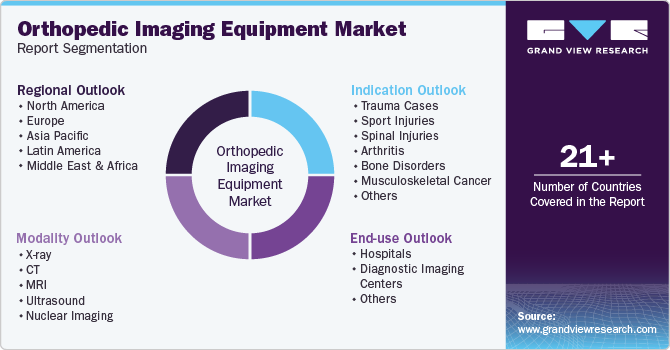
-
Modality Outlook (Revenue, USD Million, 2018 - 2030)
-
X-ray
-
CT
-
MRI
-
Ultrasound
-
Nuclear Imaging
-
-
Indication Outlook (Revenue, USD Million, 2018 - 2030)
-
Trauma Cases
-
Sport Injuries
-
Spinal Injuries
-
Arthritis
-
Bone Disorders
-
Musculoskeletal Cancer
-
Muscle Atrophy
-
Others
-
-
End-use Outlook (Revenue, USD Million, 2018 - 2030)
-
Hospitals
-
Diagnostic Imaging Centers
-
Others
-
-
Regional Outlook (Revenue, USD Million, 2018 - 2030)
-
North America
-
U.S.
-
Canada
-
-
Europe
-
UK
-
Germany
-
France
-
Italy
-
Spain
-
Denmark
-
Sweden
-
Norway
-
-
Asia Pacific
-
Japan
-
China
-
India
-
Australia
-
Thailand
-
South Korea
-
-
Latin America
-
Brazil
-
Mexico
-
Argentina
-
-
Middle East & Africa
-
South Africa
-
Saudi Arabia
-
UAE
-
Kuwait
-
-
Frequently Asked Questions About This Report
b. The global orthopedic imaging equipment market size was estimated at USD 4.92 billion in 2023 and is expected to reach USD 5.16 billion in 2024.
b. The global orthopedic imaging equipment market is expected to grow at a compound annual growth rate of 5.10% from 2024 to 2030 to reach USD 6.95 billion by 2030.
b. North America dominated the orthopedic imaging equipment market with a share of 34.4% in 2023. This is attributable to technologically advanced healthcare infrastructure, adoption of novel technologies, and the existence of several market players in the region.
b. Some key players operating in the orthopedic imaging equipment market include GE Healthcare; Philips Healthcare; Siemens Healthineers; Canon Medical Systems Corporation; Fujifilm Healthcare Solutions; Esaote; Carestream Health; Shenzhen Mindray Bio-Medical Electronics Co., Ltd.; United Imaging Healthcare Co.; Shimadzu Corporation; Hologic, Inc.
b. Key factors that are driving the market growth include growing incidence of bone injuries and orthopedic disorders and increasing penetration of imaging technology in orthopedic treatment are some of the major factors contributing to the market growth.
Share this report with your colleague or friend.
![gvr icn]()
NEED A CUSTOM REPORT?
We can customize every report - free of charge - including purchasing stand-alone sections or country-level reports, as well as offer affordable discounts for start-ups & universities. Contact us now
![Certified Icon]()
We are GDPR and CCPA compliant! Your transaction & personal information is safe and secure. For more details, please read our privacy policy.
We are committed towards customer satisfaction, and quality service.
"The quality of research they have done for us has been excellent."





